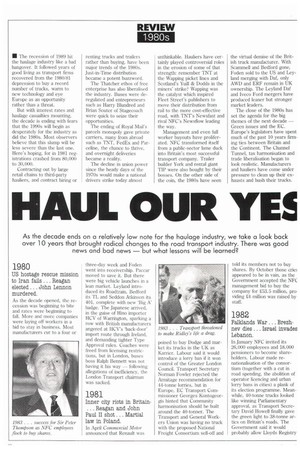REVIEW 1980s
Page 42

If you've noticed an error in this article please click here to report it so we can fix it.
El The recession of 1989 hit the haulage industry like a bad hangover. It followed years of good living as transport firms recovered from the 1980/81 depression to buy a record nwnher of trucks, warm to new technology and eye Europe as an opportunity rather than a threat.
But with interest rates and haulage casualties mounting, the decade is ending with fears that the 1990s will begin as desperately for the industry as did the 1980s. Most observers believe that this slump will be less severe than the last one. Here's hoping, for in 1981 registrations crashed from 80.0(X) to 30,000.
Contracting out by large retail chains to third-party hauliers, and contract hiring or renting trucks and trailers rather than buying, have been major trends of the 1980s. Just-in-Time distribution became a potent buzzword.
The Thatcher ethos of free enterprise has also liberalised the industry. Buses were deregulated and entrepreneurs such as Harry Blundred and Brian Souter of Stagecoach were quick to seize their opportunities.
The ending of Royal Mail's parcels monopoly gave private carriers, many from abroad such as TNT, FedEx and Parceline, the chance to thrive, and overnight deliveries became a reality.
The decline in union power since the heady days of the 1970s would make a national drivers strike today almost unthinkable. Hauliers have certainly played controversial roles in the erosion of some of that strength: remember TNT at the Wapping picket lines and Scotland's Yuill & Dodds in the miners' strike? Wapping was the catalyst which inspired Fleet Street's publishers to move their distribution from rail to the more cost-effective road, with TNT's Newsfast and rival NFC's Newsflow leading the way.
Management and even full worker buyouts have proliferated. NFC transformed itself from a public-sector lame duck into Britain's most successful transport company. Trailer builder York and rental giant T1P were also bought by their bosses. On the other side of the coin, the 1980s have seen the virtual demise of the British truck manufacturer. With Scammell and Bedford gone, Foden sold to the US and Leyland merging with Daf, only AWL) and ERF remain in UK ownership. The Leyland Daf and Iveco Ford mergers have produced leaner but stronger market leaders.
The close of the 1980s has set the agenda for the big themes of the next decade — Green issues and the EC. Europe's legislators have spent much of the past 10 years finning ties between Britain and the Continent. The Channel Tunnel, tax harmonisation and trade liberalisation began to look realistic. Manufacturers and hauliers have come under pressure to clean up their exhausts and hush their trucks.
















































































